

RSA Conference 2012 Keynote - The Rise of Hacktivism. L’Histoire d’Anonymous. Pris dans son ensemble, le concept d’Anonymous désigne une réalité vaste et complexe ; ce nom prend actuellement tout son sens dans un monde dans lequel son rôle est de coordonner une série d’initiatives décousues, lesquelles vont du trolling aux revendications politiques.
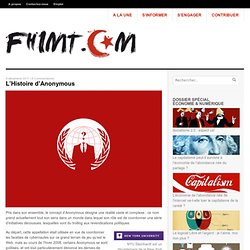
NYU Steinhardt est un département de la New York University. Son crédo est de développer des liens entre les communautés et les cultures, et d’utiliser l’éducation comme un instrument du changement pour une meilleure qualité de vie à travers le monde. Sa mission est de faire avancer les savoirs, la créativité et l’innovation à la croisée des apprentissages. Gabriella Coleman (twitter), l’auteur de cet essai est professeur au sein du département Média, Culture et Communication. Cette action a fait l’objet d’une vaste couverture médiatique portant sur la spectaculaire vague d’attaques par déni de service (DdoS) lancées par de nombreux Anonymous (contre Paypal et Mastercard, pour manifester leur soutien à Wikileaks). Does Hacktivism Matter? [28C3] Urizenus Sklar: Generation W: WikiLeaks Ignites a New Generation of Hacktivists.
While the traditional media and the United States government continue to fixate on the individual Julian Assange, a not so subtle cultural shift is taking root worldwide: Hacktivist culture is rapidly morphing from a small underground subculture into mainstream culture for a younger generation, not just in the United States, but worldwide.
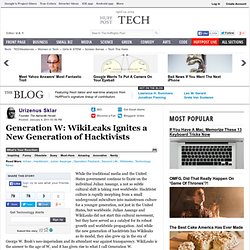
Julian Assange and WikiLeaks did not start this cultural movement, but they have served as a catalyst for its robust growth and worldwide propagation. And while the new generation of hacktivists has Wikileaks as its model, they also grew up in the era of George W. Bush's neo-imperialism and its attendant war against transparency. WikiLeaks is the answer to the age of W, and it has given rise to what I call Generation W. Once the Wrong Hands infiltrated the JLU, they leaked the contents of the JLU database, posting it in many locations online.
Assange may eventually be incarcerated or worse, but the genie is definitely out of the bottle at this point. Thom Hartmann: Are Hacktivists becoming the new journalists? Who are Anonymous? The group has taken credit for numerous attacks, including against Bank of America, Sony and the Malaysian government.

One of the difficulties authorities have had tracking down hacking attacks is that they can be launched from anywhere and can come from an individual who can mask his location. US authorities on Tuesday arrested 16 people on charges they participated in major cyber attacks, including the crippling of eBay's PayPal website as retribution for dropping WikiLeaks as a client. FBI agents arrested 14 people in nine states and Washington, DC, for the PayPal attack, which occurred last December and was allegedly coordinated by the hacking group Anonymous.
Anonymous: peering behind the mask. When Anonymous first made big headlines in early 2008 with its protests against the Church of Scientology, dubbed Project Chanology, it was not yet apparent that Anonymous would be here to stay.
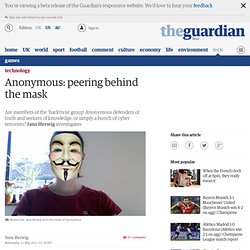
Three years later, Anonymous has not only gained a sizeable collection of adversaries and critics – including government agencies, IT security companies and digital rights advocacies who criticise its methods – it has also won scores of secret and not so secret admirers, especially among the highly social media literate, digital creative class. The reputation of its members as defenders of truth and seekers of knowledge, digital avengers who cannot be lied to because they will hijack the emails of those who try, seems to strike a chord with many. What has remained unclear is just who or what Anonymous is. Inside the secret world of hackers.
Hackerspaces are the digital-age equivalent of English Enlightenment coffee houses.
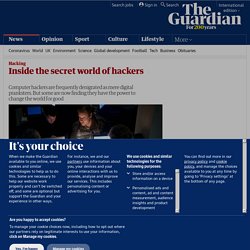
They are places open to all, indifferent to social status, and where ideas and knowledge hold primary value. In 17th-century England, the social equality and merit-ocracy of coffee houses was so deeply troubling to those in power that King Charles II tried to suppress them for being "places where the disaffected met, and spread scandalous reports concerning the conduct of His Majesty and his Ministers". Hackers to FBI: 'We are not scared anymore'
Hacker groups Anonymous and LulzSec, which had 16 of their alleged members arrested this week in the U.S. by the FBI, don't usually respond to statements written or made about them.
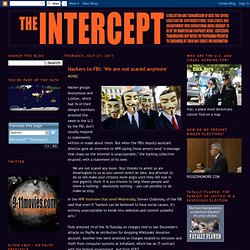
But when the FBI's deputy assistant director gave an interview to NPR saying those arrests send "a message that chaos on the Internet is unacceptable," the hacking collective erupted, with a statement of its own: We are not scared any more. Your threats to arrest us are meaningless to us as you cannot arrest an idea. Any attempt to do so will make your citizens more angry until they will roar in one gigantic choir. It is our mission to help these people and there is nothing — absolutely nothing — you can possibly to do make us stop.
WikiLeaks, protest and the law: The rights and wrongs of hacktivism. Empire - Social networks, social revolution. TV - CTV077 Information War (The Hacktivists) Information War - The Hactivists trailer Why Are Hackers Becoming So Angry? Subscribe to this blog About Author Glyn Moody's look at all levels of the enterprise open source stack.
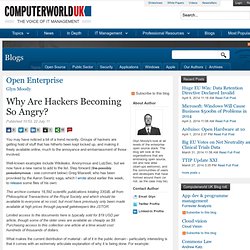
The blog will look at the organisations that are embracing open source, old and new alike (start-ups welcome), and the communities of users and developers that have formed around them (or not, as the case may be). Contact Author Email Glyn. “The internet is direct democracy.” Paul Jorion is an anthropologist who blogs about economic and financial issues.
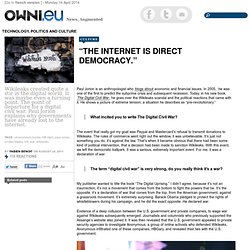
In 2005, he was one of the first to predict the subprime crisis and subsequent recession. Today, in his new book, The Digital Civil War, he goes over the Wikileaks scandal and the political reactions that came with it. He shows a picture of extreme tension, a situation he describes as “pre-revolutionary.” What incited you to write The Digital Civil War? Twenty reasons why it’s kicking off in cyberspace. In February the Newsnight economics editor Paul Mason very succinctly laid out the radically different nature of recent popular uprisings across North Africa, the Middle East and Europe compared to earlier political movements, and the economic and sociological reasons behind it.
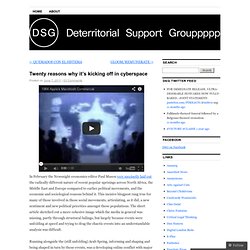
This incisive blogpost rang true for many of those involved in those social movements, articulating, as it did, a new sentiment and new political priorities amongst those populations. The short article sketched out a more cohesive image which the media in general was missing, partly through structural failings, but largely because events were unfolding at speed and trying to drag the chaotic events into an understandable analysis was difficult. So what’s going on in cyberspace? What we’re seeing is a significant escalation in serious geo-political combat, and the mainstream press has failed in it’s coverage so far. Hacktivism 15' by thibnton. Kapital-Identität-Macht 3 by kallep. Would the world be a better place if Electronic Disruption was completely legal? THE electronic disruption of Internet traffic to several sites associated with the censorship of Wikileaks over the past months, has riveted public attention on the predicament of online civil disobedience in particular the use of distributed denial of service (DDoS) as a form of protest.
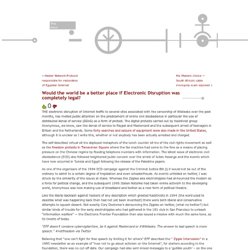
The digital protests carried out by hacktivist group Anonymous, we know, saw the denial of service to Paypal and Mastercard and the subsequent arrest of teenagers in Britain and the Netherlands. Some forty searches and seizure of equipment were also made in the United States , although it is unclear as I write this, whether or not anybody has been actually arrested and charged. The self-described virtual sit-ins deployed metaphors of the lunch counter sit-ins of the civil rights movement as well as the freedom protests in Tienanmen Square where the fax machine had come to the fore as a means of placing pressure on the Chinese regime by flooding telephone numbers with information.
Institute of Network Cultures. Hacking et engagement. cDc paramedia: text #384. _ | \ | \ | | \ __ | |\ \ __ _____________ _/_/ | | \ \ _/_/ _____________ | ___________ _/_/ | | \ \ _/_/ ___________ | | | _/_/_____ | | > > _/_/_____ | | | | /________/ | | / / /________/ | | | | | | / / | | | | | |/ / | | | | | | / | | | | | / | | | | |_/ | | | | | | | | c o m m u n i c a t i o n s | | | |________________________________________________________________| | |____________________________________________________________________| ...presents... Hacktivism, From Here to There by Oxblood Ruffin __//////\ -cDc- CULT OF THE DEAD COW -cDc- /\\\\\\__ Est. 1984 \\\\\\/ cDc paramedia: text #384-06/03/2004 \////// Est. 1984 ___ _ _ ___ _ _ ___ _ _ ___ _ _ __ |___heal_the_sick___raise_the_dead___cleanse_the_lepers___cast_out_demons__| [The following paper was presented March 28, 2004 at Yale Law School as part of the CyberCrime and Digital Law Enforcement Conference.]
"cDc. Show and prove. " I've never thought there was a lot of debate about the meaning of hacktivism. Internet security: An anonymous foe. DEFENCE companies such as Lockheed Martin have seen some of their cyber-defences penetrated. Sony, Google, Citigroup and other firms have had sensitive customer data swiped by high-tech intruders. The IMF has been the victim of a digital attack, as has the website of America's Senate.
And a hackers' collective, called Anonymous, has threatened to launch an online assault on the computer systems of America's Federal Reserve unless its chairman, Ben Bernanke, agrees to step down. These and other events—such as the attack on the public website of the CIA, which was disrupted briefly on June 15th—have led to speculation that there has been a big increase in the threat posed by hackers in recent months. They have also reinforced a belief in some quarters that America is already engaged in a cyber war of sorts, most notably with China. Information: Can you social network your way to revolution? Manifesto for a virtual revolution: Cyber-activist Cory Doctorow's new novel imagines a revolt of online slaves - Features, Books. "Someone who just accepts every technology he comes across is not being especially technophilic, because this doesn't require any reflection or choice," he argues.
"It's like saying, I'm a gourmet, I'll eat anything you put in front of me. To be a gourmet of technology is to make choices: about what you're going to use, and how you're going to use it. " Twitter, Facebook, and social activism. At four-thirty in the afternoon on Monday, February 1, 1960, four college students sat down at the lunch counter at the Woolworth’s in downtown Greensboro, North Carolina.
They were freshmen at North Carolina A. & T., a black college a mile or so away. “I’d like a cup of coffee, please,” one of the four, Ezell Blair, said to the waitress. “We don’t serve Negroes here,” she replied. The Woolworth’s lunch counter was a long L-shaped bar that could seat sixty-six people, with a standup snack bar at one end. The seats were for whites. The False Poles of Digital and Traditional Activism. Digital activism has been construed as its own movement, a new wave of organizing unique to the 21st century digital world. In fact, digital tools are complementary to “traditional” activism, for a number of reasons: They allow organizers to quickly mobilize large numbers of people; they help draw media attention to causes, and quickly; they allow for a centralized portal of information. But by drawing a distinct line between “traditional” and “digital” (or online and offline, if you prefer) activism, pundits and journalists are doing a disservice to both the utility of digital tools and to the resilience of traditional advocacy.
Www.stefaniamilan.net. Attack of the Hacktivists. Anonymous, WikiLeaks and The Matrix Generation. The Wachowski brothers’ 1999-2003 film series, The Matrix gained worldwide popularity and since its release has been very influential. It is not simply a film, but has become a cultural phenomenon. In past ages, it was philosophers like Friedrich Nietzsche and Immanuel Kant that engaged youth with deep questions and the search for meaning in their lives. Yet Neo’s conundrum “What is real?” Has become the question of our age. The future of the internet: A virtual counter-revolution. The ethics of digital direct action. Gabriella Coleman - Faculty Bio. The Anthropology of Hackers - Gabriella Coleman - Technology. JPBarlow: The first serious infowar...
Hacktivism. Overview. WikiLeaks and Hacktivist Culture. In recent months there has been considerable discussion about the WikiLeaks phenomenon, and understandably so, given the volume and sensitivity of the documents the website has released. What this discussion has revealed, however, is that the media and government agencies believe there is a single protagonist to be concerned with—something of a James Bond villain, if you will—when in fact the protagonist is something altogether different: an informal network of revolutionary individuals bound by a shared ethic and culture.
About the Author Peter Ludlow Peter Ludlow, a professor of philosophy at Northwestern University, has written on topics related to whistleblowing,... Also by the Author Prosecutors are warping the law to throw activist hackers like Aaron Swartz behind bars for years. Pirat@ge: du hacktivisme au hacking de masse. De détournement satirique à piratage, il n’y a qu’un pas. Pourtant, sans ces bidouilleurs de l'informatique, Internet serait resté au niveau du Minitel.
Capucine Cousin nous explique en quoi les hackers influencent le web. Ils sont quatre, dont trois frères, jeunes et (à première vue ;) innocents, et leur clip, “Double Rainbow song“, bidouillé non pas au fond d’un garage mais dans le salon familial, avec un piano, a attiré plus de 20 millions de visiteurs.
Un clip parodique qui a généré un buzz énorme, à partir d’une simple vidéo amateur d’un homme à la limite de la jouissance devant un phénomène rare : deux arcs en ciel… Au point – le comble – que Microsoft a recruté le “Double Rainbow guy” pour sa nouvelle pub pour Windows Live Photo Gallery. Ou quand l’industrie pirate les pirates… “La propriété c’est le vol” De détournement satirique à piratage, il n’y a qu’un pas.
A quoi ressemblerait Internet sans les pirates ? Voilà le postulat des auteurs de ce docu. Eh oui! Leur théorie ? Empire - The Network Revolution.